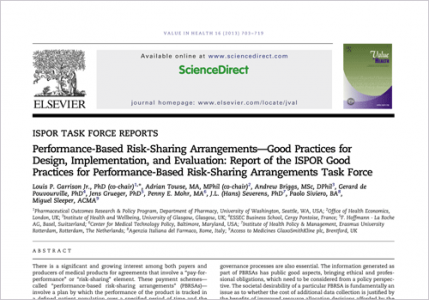Best practices for performance-based risk-sharing arrangements in health care are described in detail in this new ISPOR report, developed by a task force co-chaired by Professor…
Best practices for performance-based risk-sharing arrangements in health care are described in detail in this new ISPOR report, developed by a task force co-chaired by Professor Lou Garrison, University of Washington and Visiting Senior Research Fellow at the OHE, and Professor Adrian Towse, Director of the OHE. The report appeared in late August in Value in Health. The idea of paying only for health interventions that work at least as well as expected is intuitively attractive.
Best practices for performance-based risk-sharing arrangements in health care are described in detail in this new ISPOR[1] report, developed by a task force co-chaired by Professor Lou Garrison, University of Washington and Visiting Senior Research Fellow at the OHE, and Professor Adrian Towse, Director of the OHE[2]. The report appeared in late August in Value in Health.
The idea of paying only for health interventions that work at least as well as expected is intuitively attractive. Called “performance-based risk-sharing arrangements” (PBRSAs), these payment schemes “involve a plan by which the performance of the product is tracked in a defined patient population over a specified period of time and the amount or level of reimbursement is based on the health and cost outcomes achieved”. In part, PBSRAs are meant to address the growing recognition that ultimate real-world clinical and economic performance of a new product is uncertain when the product first reaches the market.
The objective of the report is to “set out the standards that should be applied to 'good practices'—both research and operational—in the use of a PBRSA, encompassing questions around the desirability, design, implementation, and evaluation of such an arrangement”. It thoroughly describes the various types of PBSRAs now in use, or in discussion, and offers practical recommendations for developing, assessing and implementing such schemes.
Key findings include the following:
- "PBRSAs are an understandable and logical response to increasing pressure for greater evidence of real-world effectiveness and long-term cost-effectiveness"
- All PBRSAs can provide valuable evidence that potentially have benefits worldwide. The value of that evidence is enhanced when good practice is followed in research design, implementation, and evaluation
- Because additional evidence collection is costly, it is critical that evidence collection be designed to address the main uncertainties that create reluctance among payers to reimburse or recommend use of a product. Good research practice requires appropriately matching the study design to these uncertainties
- Performance-linked reimbursement schemes appear to have been more successful than those based on coverage with evidence development. The evidence, however, is limited, mixed, qualitative, and partial; research evaluating the actual effects of PBRSAs is sparse.
[2] The other members of the Task Force who contributed to the report are: Andrew Briggs, University of Glasgow; Gerard de Pouvourville, ESSEC Business School, France; Jens Grueger, F. Hoffmann-La Roche; Penny Mohr, Center for Medical Technology Policy, USA; J.L. Severens, Erasmus University Rotterdam; Paolo Siviero, AIFA (Italian Medicines Agency); and Miguel Sleeper, GlaxoSmithKline.
For a recent slide presentation by Prof Towse that discusses PBSRAs, please click here.
